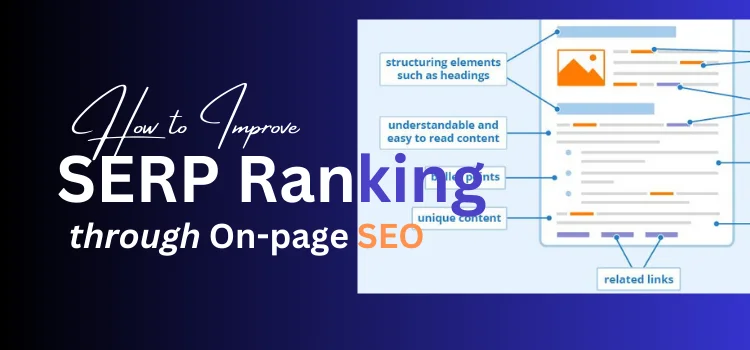How To Improve SERP Rankings Using On-Page SEO
On-page SEO is the process of optimizing your website’s content and structure to improve its ranking in search engine results pages (SERPs).
By improving your on-page SEO, you can make your website more visible to potential customers and increase traffic to your site.
Here are some original tips on how to improve SERP rankings using on-page SEO:
How to Improve Your Website’s Position on the SERP Ranking
There are quite a few things that you can do to improve your SERP ranking.
But we will cover the core factors in this post which include:
1. Track Your Current SERP Ranking
It can be tempting to want to get down to improving your SERP ranking straight away with whatever information is at your disposal.
But this process is not one you want to follow blindly or live to hope.
What I do is figure out the current positions for the different keywords on my site.
That way, I know what my priority updates should be; since pages and posts higher up in the SERP ladder are more likely to continue to do better in ranking.
Begin by identifying the current positions of the various keywords associated with your site.
This will serve as the foundation for your content update SEO strategy.
Pages and posts that rank higher on the SERP ladder tend to perform better, making them your top priority for optimization.
Create a spreadsheet to organize this data effectively:
Example SERP Ranking Spreadsheet
| Ranking Position | Post Title | Post URL | Keyword |
|---|---|---|---|
| 1st | Best Smartphone | www.example.com/smartphone | Smartphone Reviews |
| 2nd | How to Bake a Cake | www.example.com/baking | Baking Recipes |
| 3rd | Travel Tips | www.example.com/travel | Travel Destinations |
| 4th | Investing 101 | www.example.com/investing | Financial Planning |
| 5th | Home Decor Ideas | www.example.com/home-decor | Interior Design |
Once you have this information at hand, you can create a ‘content update schedule’ to guide your next steps.
2. Bring Your Content Quality to Speed
High-quality content is the cornerstone of effective on-page SEO.
Your website’s content should not only be informative but also engaging, well-written, and up-to-date.
That’s a ton of work, but thanks to AI writing software to streamline the writing and updating process with a prompt and a few clicks.
Following your content update schedule, start by updating your priority content down to the last on your list.
3. Re-optimize Your Content for Relevant Keywords
Optimizing your content for keywords that resonate with your target audience is vital.
Utilize keyword research tools to identify these keywords effectively.
Here are some key strategies to consider:
4. Optimize Title Tags and Meta Descriptions
Your title tags and meta descriptions are the first things users see in the SERPs.
Ensure they are clear, concise, and informative. Incorporate your target keywords without overusing them.
5. Create High-quality Content
Your content should be well-crafted, informative, and relevant to your audience.
Incorporate your target keywords naturally throughout your content, avoiding keyword stuffing.
6. Leverage images and videos:
Engage your audience with multimedia content.
Images and videos not only enhance engagement but can also improve your SERP ranking.
Optimize these media elements by including target keywords in file names and alt text.
7. Enhance Website Structure
Ensure your website is easy to navigate for both users and search engines.
Use headings and subheadings to break up content, making it more readable. Maintain a clear hierarchy within your site.
8. Incorporate Internal Links
Internal links guide users to relevant information and help search engines understand your site’s structure.
Establish clear connections between different pages on your website.
9. Integrate relevant external links:
External links to reputable websites provide additional information to users and establish your site as an authority on the topic.
Additional Strategies for Improving SERP Rankings
To further bolster your SERP rankings through on-page SEO, consider the following additional strategies:
10. Regularly Update Content:
Search engines favor websites with fresh, up-to-date content. Keep your content current, particularly if you target keywords related to current events or trends.
11. Optimize for Mobile Eevices
As an increasing number of users access the internet via smartphones and tablets, it’s crucial to ensure your website is mobile-friendly. This ensures you don’t miss out on potential traffic.
12. Choose the Right Plugins and Themes
Numerous plugins and themes are available to aid in SEO improvement.
These tools can help optimize title tags and meta descriptions, create multimedia content, and enhance your website’s structure.
Conclusion
Effective on-page SEO is a fundamental aspect of achieving a prominent online presence.
By carefully assessing your current SERP ranking, elevating your content quality, optimizing for relevant keywords, and implementing additional strategies, you can substantially improve your website’s position on search engine results pages.
Both now and in the foreseeable future, mastering on-page SEO is the key to attracting more visitors from Search Engines.
Boos website’s ranking in the competitive world of SERPs.
Checkout the on-page SEO definitive guide.

